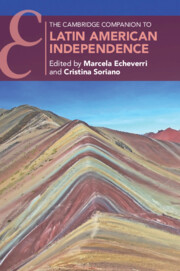34 results
10 - Royalists, Monarchy, and Political Transformation in the Spanish Atlantic World during the Age of Revolutions
- from Part I - The Spanish Empire
-
-
- Book:
- The Cambridge History of the Age of Atlantic Revolutions
- Published online:
- 20 October 2023
- Print publication:
- 09 November 2023, pp 277-303
-
- Chapter
- Export citation
Copyright page
-
- Book:
- The Cambridge Companion to Latin American Independence
- Published online:
- 16 March 2023
- Print publication:
- 23 March 2023, pp iv-iv
-
- Chapter
- Export citation
Contributors
-
- Book:
- The Cambridge Companion to Latin American Independence
- Published online:
- 16 March 2023
- Print publication:
- 23 March 2023, pp xi-xiv
-
- Chapter
- Export citation
Bibliography
-
- Book:
- The Cambridge Companion to Latin American Independence
- Published online:
- 16 March 2023
- Print publication:
- 23 March 2023, pp 336-396
-
- Chapter
- Export citation
Maps
-
- Book:
- The Cambridge Companion to Latin American Independence
- Published online:
- 16 March 2023
- Print publication:
- 23 March 2023, pp x-x
-
- Chapter
- Export citation
Introduction
-
-
- Book:
- The Cambridge Companion to Latin American Independence
- Published online:
- 16 March 2023
- Print publication:
- 23 March 2023, pp 1-22
-
- Chapter
- Export citation
Contents
-
- Book:
- The Cambridge Companion to Latin American Independence
- Published online:
- 16 March 2023
- Print publication:
- 23 March 2023, pp vii-viii
-
- Chapter
- Export citation
Maps
-
- Book:
- The Cambridge Companion to Latin American Independence
- Published online:
- 16 March 2023
- Print publication:
- 23 March 2023, pp xvii-xviii
-
- Chapter
- Export citation
Dedication
-
- Book:
- The Cambridge Companion to Latin American Independence
- Published online:
- 16 March 2023
- Print publication:
- 23 March 2023, pp v-vi
-
- Chapter
- Export citation
Acknowledgments
-
- Book:
- The Cambridge Companion to Latin American Independence
- Published online:
- 16 March 2023
- Print publication:
- 23 March 2023, pp xv-xvi
-
- Chapter
- Export citation
Contributors
-
- Book:
- The Cambridge Companion to Latin American Independence
- Published online:
- 16 March 2023
- Print publication:
- 23 March 2023, pp xi-xiv
-
- Chapter
- Export citation
9 - Shades of Unfreedom
-
-
- Book:
- The Cambridge Companion to Latin American Independence
- Published online:
- 16 March 2023
- Print publication:
- 23 March 2023, pp 276-311
-
- Chapter
- Export citation
Index
-
- Book:
- The Cambridge Companion to Latin American Independence
- Published online:
- 16 March 2023
- Print publication:
- 23 March 2023, pp 397-420
-
- Chapter
- Export citation
Figures
-
- Book:
- The Cambridge Companion to Latin American Independence
- Published online:
- 16 March 2023
- Print publication:
- 23 March 2023, pp ix-ix
-
- Chapter
- Export citation

The Cambridge Companion to Latin American Independence
-
- Published online:
- 16 March 2023
- Print publication:
- 23 March 2023
Colombia - Crafting a Republic for the World: Scientific, Geographic, and Historiographic Inventions of Colombia. By Lina del Castillo. Lincoln: University of Nebraska Press, 2018. Pp. 402. $50.00 cloth; $30.00 paper.
-
- Journal:
- The Americas / Volume 76 / Issue 4 / October 2019
- Published online by Cambridge University Press:
- 03 October 2019, pp. 721-723
- Print publication:
- October 2019
-
- Article
- Export citation
Jason McGraw , The Work of Recognition: Caribbean Colombia and the Postemancipation Struggle for Citizenship (Chapel Hill, NC: University of North Carolina Press, 2014), pp. xiii + 328, $34.95, pb.
-
- Journal:
- Journal of Latin American Studies / Volume 49 / Issue 3 / August 2017
- Published online by Cambridge University Press:
- 20 July 2017, pp. 695-697
- Print publication:
- August 2017
-
- Article
- Export citation
5 - Slaves in the defense of Popayán
-
- Book:
- Indian and Slave Royalists in the Age of Revolution
- Published online:
- 05 April 2016
- Print publication:
- 25 April 2016, pp 157-190
-
- Chapter
- Export citation
6 - “The yoke of the greatest of all tyrannical intruders, Bolívar”
-
- Book:
- Indian and Slave Royalists in the Age of Revolution
- Published online:
- 05 April 2016
- Print publication:
- 25 April 2016, pp 191-223
-
- Chapter
- Export citation
Copyright page
-
- Book:
- Indian and Slave Royalists in the Age of Revolution
- Published online:
- 05 April 2016
- Print publication:
- 25 April 2016, pp viii-viii
-
- Chapter
- Export citation



